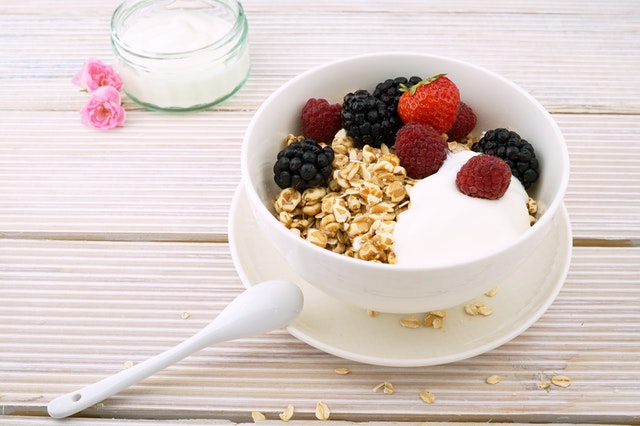Diverse communities of microorganisms live all over the human body – both inside and outside.1 These microbial cells exist in almost equal proportions to human cells, with an estimated total number of 38 trillion.1
In the human gastrointestinal tract, the resident bacteria of the gut microbiome help with digestion and are influenced by the types of foods we consume.2
Unfortunately, certain foods can reduce the diversity of the gut microbiota, which in turn may lead to conditions such as irritable bowel disease, irritable bowel syndrome, and peptic ulcers.2
To maintain gut health, it is important to be aware of what foods are good and bad for the microbiome.
What foods are bad for the microbiome?
According to research on diet and gut health, foods that should be consumed less include
- processed foods,
- artificial sweeteners,
- and red meat.
Processed foods
In North America, eating ultra-processed foods has been on the rise.3 The term “ultra-processed foods” defines foods that have been extensively modified with different additives such as
- fats,
- sugars,
- salts,
- and flavor enhancers.3
Ultra-processed foods contain a high amount of calories and a low nutritional value.3 The consumption of processed foods is linked to inflammation that may, in the long-term, increase the risk of developing obesity, type 2 diabetes, and cardiovascular disease.4
Artificial sweeteners
Although artificial sweeteners were created to mimic the taste of sugar without the calories, they can be hundreds to thousands of times sweeter.4
Artificial sweeteners (such as saccharin and sucralose) are generally well-tolerated and safe, however, research suggests that certain types may change the composition of the gut microbiome.4
By reducing the diversity of bacteria found in the gut, sustained consumption of artificial sweeteners can negatively influence their function in digesting foods and interacting with the immune system to regulate inflammation.4
Red meat
Red meat contains high levels of the nutrient L-carnitine.5 When digested by microbes in the gut, L-carnitine is broken down into a long-named compound called “trimethylamine-N-oxide”.5
The creation of this by-product is associated with a high risk of developing cardiovascular disease.5
People who are vegetarians or vegans actually have low levels of the specific microbes involved in L-carnitine digestion, and therefore, have generally improved heart health compared to their omnivore counterparts.5
Limiting or stopping the intake of red meat may also help diversify the ecosystem of gut microorganisms.2
What foods are good for the microbiome?
The good news is that gut health can be improved with the right diet. Foods that are good for the microbiome are suggested to be
- yogurt,
- broccoli,
- and oats.
Yogurt
Intake of probiotic foods, specifically yogurt, is associated with several health benefits, one of which includes promoting a healthy gastrointestinal tract.1
Bacteria of the genus Bifidobacterium and Lactobacillus are helpful microorganisms and abundant in yogurt.1 Following yogurt consumption, these bacteria can become incorporated into the communities already living in the gut.6
The types of bacteria found in the gastrointestinal tract can begin to change as early as one week following the daily intake of yogurt.1
Broccoli
As a cruciferous vegetable, broccoli is rich in fiber and phytonutrients that are broken down by gut microbes.7
Research on broccoli and gut health suggests that eating 200 grams of cooked broccoli per day can lead to an increase in the types of bacterial species found in the gut.7
Broccoli intake can also increase the relative amount of helpful Bacteroidetes bacteria to harmful Firmicutes bacteria.7
A higher ratio of Bacteroidetes to Firmicutes is associated with a healthier diet and body leanness.7
Oats
Similar to yogurt and broccoli, oat intake may alter the composition of the gut microbiome for the better.8
A research study that examined the effects of eating 80 grams of oats each day found an increase in bacteria that promote healthy metabolism as well as reduce the risk of developing obesity and coronary heart disease.8
Oat intake was also shown to improve fatty acid metabolism and lead to a decrease in total cholesterol levels.8
Food and the microbiome
Since food can alter the microbiome, it is important to consider what foods are good and bad for the microbiome. Research suggests that it may be a good idea to avoid processed foods, artificial sweeteners, and red meat but eat more yogurt, broccoli, and oats.
Overall, our understanding of how specific foods impact the microbiome, and health in general, remains relatively limited, and further research is necessary.
References
- Lisko DJ, Johnston GP, Johnston CG. Effects of dietary yogurt on the healthy human gastrointestinal (Gi) microbiome. Microorganisms. 2017;5(1). doi:10.3390/microorganisms5010006
- Tomova A, Bukovsky I, Rembert E, et al. The effects of vegetarian and vegan diets on gut microbiota. Front Nutr. 2019;6(April). doi:10.3389/fnut.2019.00047
- Zinöcker MK, Lindseth IA. The western diet–microbiome-host interaction and its role in metabolic disease. Nutrients. 2018;10(3):1-15. doi:10.3390/nu10030365
- Ruiz-Ojeda FJ, Plaza-Díaz J, Sáez-Lara MJ, Gil A. Effects of sweeteners on the gut microbiota: A review of experimental studies and clinical trials. Adv Nutr. 2019;10:S31-S48. doi:10.1093/advances/nmy037
- Buffa JA, Romano KA, Copeland MF, et al. The microbial gbu gene cluster links cardiovascular disease risk associated with red meat consumption to microbiota L-carnitine catabolism. Nat Microbiol. 2022;7(1):73-86. doi:10.1038/s41564-021-01010-x
- Le Roy CI, Kurilshikov A, Leeming ER, et al. Yoghurt consumption is associated with changes in the composition of the human gut microbiome and metabolome. BMC Microbiol. 2022;22(1):1-12. doi:10.1186/s12866-021-02364-2
- Kaczmarek JL, Liu X, Charron CS, et al. Broccoli consumption affects the human gastrointestinal microbiota. J Nutr Biochem. 2019;63:27-34. doi:10.1016/j.jnutbio.2018.09.015
- Xu D, Feng M, Chu YF, et al. The prebiotic effects of oats on blood lipids, gut microbiota, and short-chain fatty acids in mildly hypercholesterolemic subjects compared with rice: A randomized, controlled trial. Front Immunol. 2021;12(December):1-16. doi:10.3389/fimmu.2021.787797



